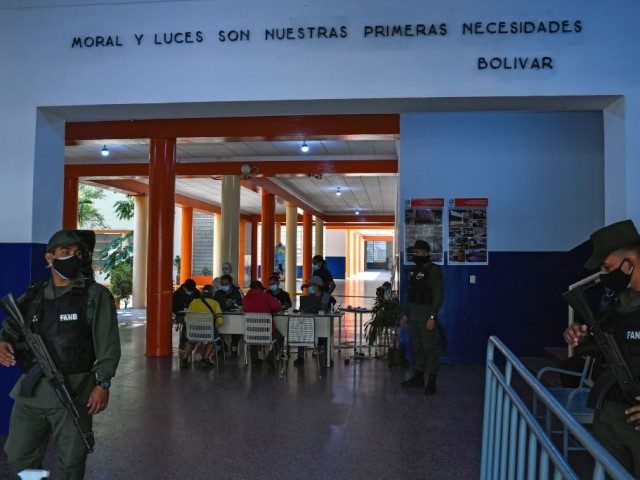CARACAS — The efforts of a group of Venezuelan opposition members to activate a recall vote against socialist dictator Nicolás Maduro ended in an abrupt failure after a marred process full of obstacles, threats, and impossible-to-achieve deadlines.
Removing Maduro via a recall vote process was a venture destined to fail in the context of Venezuela’s current political situation, as Maduro has been illegally occupying the presidency since the results of the 2018 sham elections. To activate a recall process against Maduro would have meant that the opposition had to recognize Maduro’s presidency as a legitimate one. Venezuela does not have any precedent that would apply to the current scenario of recalling someone from a public office to which they are not legally entitled.
On January 10, three different groups each made a request to the Maduro-controlled Venezuelan Electoral Council (CNE) for the activation of a recall vote process against Maduro. All three requests were approved a week later. To doom the process to failure, the CNE designated January 26 as the date that Venezuelans could sign the corresponding petition to express their desire to activate the process, giving the opposition less than a day to gather approximately 4.2 million signatures.
To further complicate the process, the CNE authorized a very limited number of centers to gather signatures and gave the team only 12 hours to collect the signatures of at least 20 percent of the country’s electorate in each of the country’s states — roughly 4.2 million signatures across 1,200 centers. Organizers condemned the conditions as impossible to comply with, and promoters of the recall efforts called for people not to participate in their own plan.
If the impossible conditions were not enough, alleged drug lord and United Socialist Party of Venezuela (PSUV) strongman Diosdado Cabello stated that the PSUV would demand access to the lists of signatories, exposing the supporters of the recall to government retribution. This was a huge deterrent against citizen participation, because the events of the failed recall vote against Hugo Chávez in 2004 are still fresh in the collective memory of the country’s citizens.
At that time, pro-Chavista politician Luis Tascon made a similar request. The data he obtained was compiled into what Venezuelans infamously refer to as the “Tascon List” and then distributed through “Maisanta,” a rudimentary piece of software, via CD-ROMs. This was at a time before social media, smartphones, and extensive internet use.
The Tascon List is still used to discriminate against those who signed up to recall Chávez, barring them from obtaining jobs and denying them government benefits.
The regime made its characteristic intimidation even more blatant at signature collection sites. It located one center, for example, next to a mural of Chávez, surrounded by the National Guard, representatives of the Socialist Party, and members of the extralegal pro-chavista paramilitary forces known as the colectivos.
Este centro de recolección de firmas que tiene la imagen de Chávez al fondo, se ubica en la UE Mariano Picón Salas en Petare. Tenía siete militares, un testigo del PSUV y colectivos alrededor. En los 25 minutos que estuvimos no se presentaron ciudadanos dispuestos a participar. pic.twitter.com/zVndBv0LuP
— Osmary Hernandez (@osmarycnn) January 26, 2022
The turnout for the recall vote signature effort was minimal.
#23Ene 9:30am #Mérida #Revocatorio@AdanContreras2: "Punto habilitado por el CNE en la plaza Bolívar de Bailadores Mcpio Rivas Dávila no registra personas en cola para manifestar su voluntad. @CesarPerezVivas aseguró que "a partir de hoy Maduro es doblemente ilegítimo"" pic.twitter.com/9OXX3hdVLk
— Reporte Ya (@ReporteYa) January 26, 2022
#26Ene #Revocatorio #NuevaEsparta
Algunos puntos electorales en el estado en esta jornada de recolección de firmas para activación de referéndum revocatorio. – @VPITVpic.twitter.com/57lDxjcICL— Reporte Ya (@ReporteYa) January 26, 2022
The electoral council had announced that it would audit the signatures and announce a decision by February 13. On January 28, the entire process was deemed inadmissible, as only 42,421 signatures were allegedly collected.
The Venezuelan Movement for the Recall will soon request that the Venezuelan Supreme Court – also controlled by Maduro’s henchmen – annul the process through a legal formality. Venezuela’s judicial system is under the complete control of the Socialist Party. César Pérez Vivas, spokesman of the movement, announced that the organization would denounce the CNE’s actions to the United Nations.
Jorge Rodriguez, PSUV congressman and brother of the current vice-president, has threatened he will take legal actions against the promoters of the “reckless” recall vote attempt, without further details or explanations of what legal violation he would be charging.
The option of a recall vote did not exist in Venezuela until it was introduced by the Bolivarian revolution in its 1999 constitution rewrite. It allows Venezuelan voters to remove a specific elected official after half of their current term has elapsed.
All attempts to use it against both Hugo Chávez and Nicolás Maduro have been tampered with in a multitude of ways. This marks the second time that the Venezuelan opposition has unsuccessfully attempted to remove Maduro via this route. In 2016 a similar attempt was made that was completely halted by the socialist regime.
Maduro celebrated the results of the failed recall vote efforts. “They failed again, the putschist, extremist right,” he stated, while blaming Juan Guaidó, Venezuela’s legitimate yet useless president, for that failure.
Guaidó accused Maduro of “stealing” the possibility of a recall vote. Because of constitutional stipulations, and despite the fact that Maduro’s current presidency is an illegitimate one, another attempt at recalling Maduro cannot take place for the remainder of the current term, effectively shielding him from another recall vote. If Maduro, who intends to remain in power until 2030, runs for president in a most certainly rigged process in 2025, Venezuelans would have to wait until 2028 to attempt to recall him again.
Christian K. Caruzo is a Venezuelan writer and documents life under socialism. You can follow him on Twitter here.

COMMENTS
Please let us know if you're having issues with commenting.